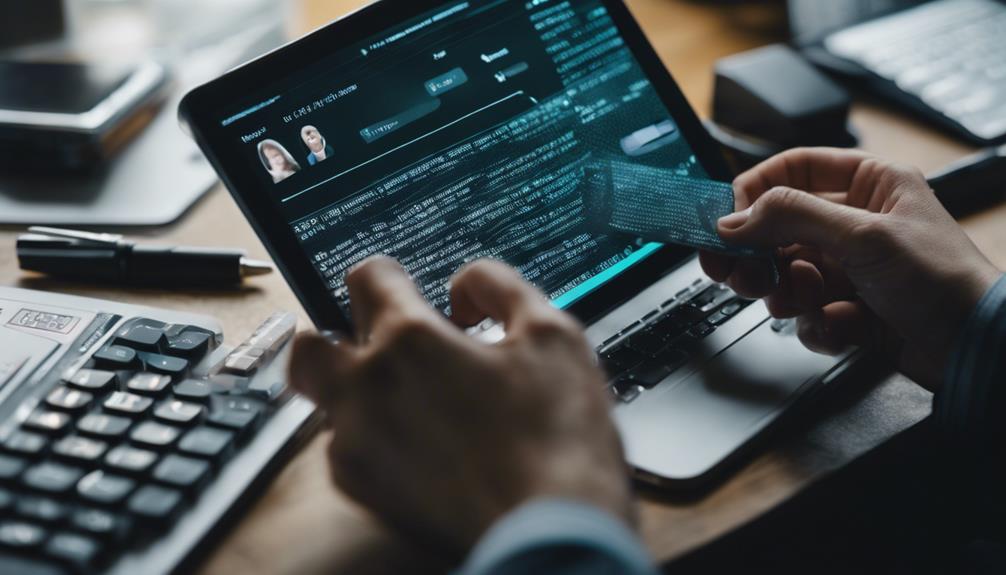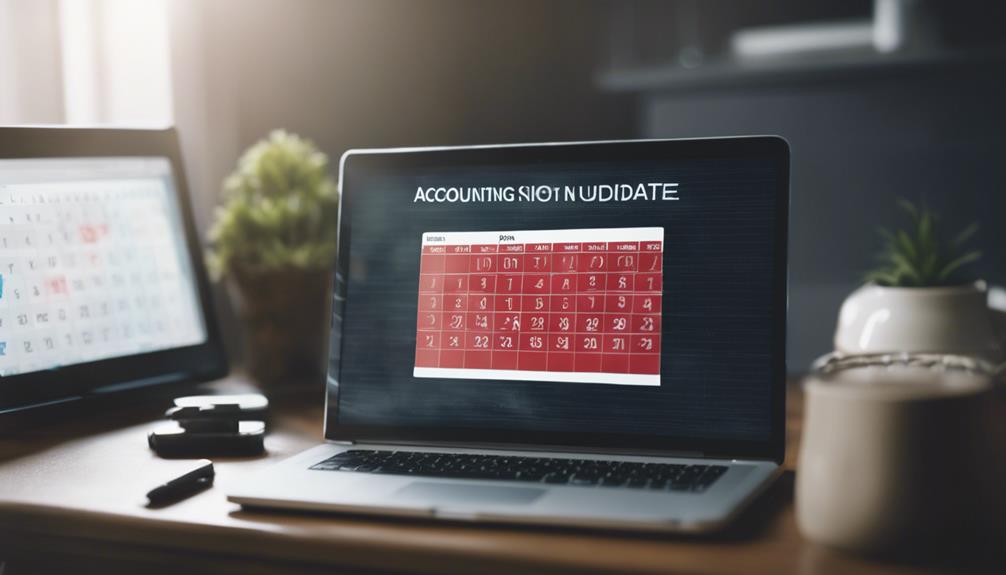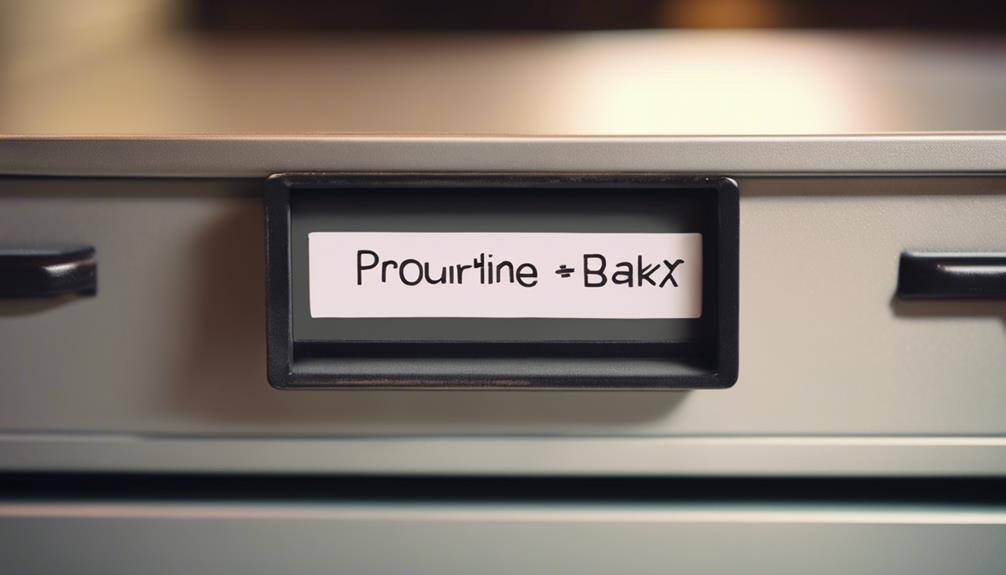When it comes to safeguarding your accounting data, staying ahead of potential threats is paramount. By incorporating the seven best practices outlined for securing accounting data, you can fortify your financial records and shield them from unauthorized access.
Each practice plays a crucial role in enhancing the security of your sensitive information, but there's one key aspect you can't afford to overlook.
Key Takeaways
- Implement strict access controls and encryption to safeguard accounting data.
- Enforce multi-factor authentication for enhanced data protection.
- Comply with data regulations like GDPR and HIPAA for secure handling.
- Conduct regular security assessments and patch management to bolster defenses.
Secure Employee Access and Training
How can you ensure secure access to sensitive accounting data while providing comprehensive training to employees? To achieve this, it's imperative to implement strict access controls, such as role-based permissions, to limit employee access to only the data necessary for their roles.
Regular training on data security practices and procedures is essential to keep employees informed about potential threats and best practices. Additionally, enforcing strong password policies, including regular updates and multifactor authentication, can significantly enhance the security of your systems.
Moreover, conducting thorough background checks and credit checks on employees with access to accounting data can help mitigate insider threats. Enforcing confidentiality agreements and educating employees on the severe consequences of data breaches can instill a sense of responsibility and awareness among staff members.
Implement Robust Data Encryption

When securing accounting data, it's crucial to implement robust data encryption methods such as AES 256-bit encryption to protect sensitive information.
By encrypting data at rest and in transit, you add a strong layer of defense against potential breaches.
Utilizing advanced encryption standards ensures that even if unauthorized access occurs, the data remains safeguarded and unintelligible.
Strong Encryption Methods
To enhance the security of accounting data, it's crucial to implement robust encryption methods such as AES with 256-bit encryption and utilize encryption algorithms like RSA for secure data transmission.
Additionally, employing SSL/TLS protocols for encrypting data in transit over networks and utilizing hardware-based encryption solutions can further enhance data security.
It's essential to prioritize encryption key management and rotation practices to ensure the confidentiality of sensitive accounting data.
By implementing these strong encryption methods, you can significantly bolster the security of your accounting data and mitigate the risk of unauthorized access or data breaches.
Data Protection Techniques
Implement robust data encryption techniques to safeguard sensitive accounting information effectively.
Robust data encryption utilizes algorithms to convert data into unreadable code, protecting it from unauthorized access. Encryption keys are essential for decrypting the data, adding an extra layer of security.
The Advanced Encryption Standard (AES) is commonly used to secure data at rest and in transit, ensuring confidentiality and integrity. By employing encryption, organizations can comply with data protection regulations like GDPR and HIPAA, preventing data breaches and unauthorized disclosures.
Robust data encryption ensures that even if data is compromised, it remains unreadable to unauthorized individuals, enhancing overall data security and ensuring compliance with relevant regulations.
Establish Multi-Factor Authentication

For enhanced security measures in safeguarding accounting data, the establishment of multi-factor authentication is crucial.
Multi-factor authentication requires users to provide two or more forms of verification, such as passwords, biometric data, security tokens, or mobile phone codes, before accessing their accounts.
This additional layer of security significantly reduces the risk of unauthorized access, data breaches, and identity theft.
Regularly Update Software and Systems

To safeguard your accounting data effectively, it's crucial to prioritize patch management and conduct vulnerability assessments regularly.
Updating software and systems promptly ensures that known security weaknesses are promptly addressed, bolstering your defenses against potential cyber threats.
Patch Management Importance
By regularly updating your software and systems, you can significantly reduce the risk of cyber attacks targeting your accounting data. Patch management plays a crucial role in addressing known vulnerabilities promptly, preventing hackers from exploiting unpatched software to gain unauthorized access to sensitive information. Updating your software regularly not only helps prevent security breaches and data leaks but also enhances the overall security posture of your accounting systems by fixing security flaws. Failure to keep your software up to date leaves your accounting data exposed to potential security threats and compromises. Ensure you prioritize patch management to safeguard your accounting data effectively.
| Patch Management Importance | |
|---|---|
| Reduces Cyber Risks | Addresses Vulnerabilities |
| Prevents Unauthorized Access | Enhances Security Posture |
Vulnerability Assessment Benefits
Regularly updating your software and systems through vulnerability assessments is a proactive measure to enhance the security of your accounting data. Conducting these assessments helps identify weaknesses in your systems, aiding in the detection of potential entry points for cyber attacks.
By updating your software and systems based on the findings of vulnerability assessments, you strengthen your overall security measures, ensuring better data security and access control. These assessments also assist in prioritizing security patches and updates, allowing you to address the most critical vulnerabilities promptly.
Embracing regular vulnerability assessments is a strategic approach to proactively enhance your data protection and safeguard your accounting information from potential threats.
Conduct Routine Data Backups

Ensuring routine data backups are conducted with meticulous attention to detail is crucial in safeguarding accounting data against potential loss or breaches. Regular data backups play a vital role in protecting sensitive accounting information from unforeseen events such as system failures or cyberattacks. By backing up data regularly, you create a safety net that allows for the quick and efficient recovery of critical financial data when needed. Automated scheduled backups can reduce the risk of human error, ensuring that no important information is missed during the backup process.
Additionally, storing backups in secure off-site locations adds an extra layer of security by protecting against physical damage or theft. It's essential to test these backups regularly to guarantee that the data can be restored successfully. By following these practices diligently, you not only safeguard your accounting systems but also demonstrate a commitment to protecting customer data and maintaining the integrity of your financial records.
Monitor and Audit Account Activity

To enhance the security of your accounting data effectively, closely monitoring and auditing account activity is paramount. By implementing the following practices, you can better safeguard your financial information:
- Regularly monitor account activity for any signs of unusual transactions or unauthorized access.
- Utilize audit trails to track changes and activities within the accounting system, ensuring accountability.
- Conduct periodic reviews of user permissions and access levels to prevent unauthorized entry.
- Set up automated alerts to promptly notify you of any suspicious behavior in account activity.
Develop a Comprehensive Incident Response Plan

In preparing to fortify the security of your accounting data, a crucial step involves developing a comprehensive incident response plan that delineates procedures for addressing potential data breaches or security incidents. This plan is essential as it clearly defines roles and responsibilities, ensuring that everyone knows their part in handling and mitigating security incidents effectively.
Regular testing of the incident response plan is vital to assess readiness and pinpoint areas for improvement. Communication protocols established within the plan enable a swift and efficient response to security incidents, minimizing potential damage.
Post-incident reviews play a critical role in analyzing the response to incidents, identifying weaknesses, and enhancing the plan for future occurrences. By focusing on these key elements—incident response plan, roles and responsibilities, regular testing, communication protocols, and post-incident reviews—you can strengthen your accounting data security measures and bolster your overall resilience to potential threats.
Frequently Asked Questions
How Do You Secure Accounting Information?
To secure accounting information, you encrypt data for protection. You control access to restrict unauthorized entry. It is essential to back up data regularly to prevent loss. Using secure passwords for defense is crucial. Additionally, implementing cybersecurity measures helps safeguard against threats.
What Are the Best Practices for Data Security?
When safeguarding data, prioritize the following measures:
- Encryption methods ensure data protection during transmission and storage.
- Access controls limit unauthorized entry to sensitive information.
- Regular audits help identify vulnerabilities.
- Cloud security enhances data protection.
- Employee training reduces human error risks.
How Do You Protect Accounting Data From Third Party Access?
To protect accounting data from third party access, focus on the following key measures:
- Implement strict access restrictions
- Use robust encryption techniques
- Enforce multi-factor authentication
- Regularly back up data
- Maintain a secure network environment
What Is Data Security in Accounting?
To ensure robust data security in accounting, you must adopt encryption methods, access controls, data backups, security protocols, and user authentication. These measures safeguard financial information from unauthorized access, ensuring confidentiality, integrity, and availability.
Conclusion
In conclusion, implementing these best practices for securing accounting data is vital for protecting sensitive financial information.
While it may seem overwhelming at first, remember that taking proactive steps to safeguard your data can prevent costly breaches and ensure the integrity of your financial records.
By prioritizing data security and following these guidelines, you can confidently protect your accounting data and minimize risks in today's digital landscape.